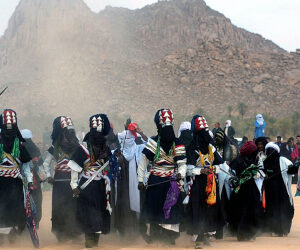October 31, 2012 |
Jeremy Bowen focused on his experiences in Libya when he discussed his latest book: The Arab Uprisings: the people want the fall of the regime, during a lecture at the London School of Economics.
Bowen, who was an undergraduate at the LSE during the late 70s, said that one of the privileges of being a news reporter for the BBC is that at times you find yourself in a place in the world where everybody wants to know what is happening that day.
 “I was very conscious of that in February last year when I was in the Rixos Hotel in Tripoli, the five star golden cage where the Gaddafi regime had installed journalists they had let in. Saif Al Islam thought he could manipulate the media. He turned up in fine knit wear and said ‘while you are here you may hear bangs and crashes in the night but let me assure you they are fireworks as people will be celebrating the triumph of my father and his regime. What we have is a local difficulty’.”
“I was very conscious of that in February last year when I was in the Rixos Hotel in Tripoli, the five star golden cage where the Gaddafi regime had installed journalists they had let in. Saif Al Islam thought he could manipulate the media. He turned up in fine knit wear and said ‘while you are here you may hear bangs and crashes in the night but let me assure you they are fireworks as people will be celebrating the triumph of my father and his regime. What we have is a local difficulty’.”
Jeremy Bowen’s Book The Arab Uprisings: the people want the fall of the regime
Bowen admitted that as a journalist you give up a certain amount of autonomy and freedom for the chance to pull back the curtain and peak inside the dark kingdom. In Libya that involved quite a bit of sneaking around. To get up and about in Libya required a rat like cunning to get to places like Tajoura the satellite town of Tripoli, a hot bed of revolutionary activity.
He described his interview with Colonel Gaddafi – like so many things in Gaddafi’s Libya it happened at the last minute. The interview was secured by the son of Libya’s head of intelligence Abdullah Al Senussi dressed as a designer urban guerrilla.
“One of the strange things about the inside of the Gaddafi regime was that they were very star-conscious. He had on a green combat style designer jacket of beautiful fabric and a black Kashmir hat.”
Bowen recalled wanting to change into a suit but Senussi told him he looked fine. Surprisingly the interview was held in a very trendy glass and steel Italian restaurant overlooking Tripoli docks. Gaddafi conformed to his image and was dressed in beautiful robes. That was before the call by the Arab League for a no-fly zone and the vote in the United Nations for all necessary measures to be taken against Gaddafi’s Libya to protect civilians. That phrase is what NATO interpreted as a charter for regime change.
“At the time the international constellation of forces had not coalesced against Gaddafi and he was self confident. Gaddafi was where he wanted to be – taking on the world. A few years later I was at the UN General Assembly where Gaddafi gave an extraordinary rambling speech, complete with the yellow pad which he held up. During the interview he was very willing to talk. I managed to irritate him enough to switch into English. He said :”My people love me, they will die for me.” For the Libyans seeing the brother Leader being asked direct questions was a totally new experience. I didn’t think Gaddafi was mad. He was bad. He lived in quite a bubble. He was surrounded by cheering crowds wherever he went. He had spilt a lot of blood, he felt his power was pretty secure. He quite liked being what Ronald Reagan described as the ‘mad dog’ of the Middle East, feeling it is me against the world.”
Bowen also described Mousa Ibrahim, Gaddafi’s spokesman who was humble at first but later became more confident as he got closer to the regime. He asked Bowen to get him on the BBC Hard Talk programme. “I think he was someone who thought he was living the dream. He said:’ it is incredible, a year ago I was a student in London now I am on hard talk’.”
The BBC correspondent admitted that he was taken by surprise by the Arab uprisings – but so were Messrs Gaddafi, Assad, Mubarak and Ben Ali. He was in Cairo at the beginning of the protests and believed he would be home for the weekend. There were many fires smouldering . The organiser of one of the protests in Cairo admitted that he was surprised as well. There was a proud history of protests in Cairo but the protesters chanted and were then in the back of police vans getting a kicking.
“I saw old men, some of them practically dressed in rags throwing themselves against the police. I thought to myself Mubarak has got a big problem. This thing could get a critical mass. I was in Iran after the Green Movement protested about the outcome of the elections but after a week the protesters were down to the people from North Tehran and students. Against the thugs the regimes put against them they did not have a chance.”
Bowen pointed out that the aging leaders were grooming their sons to succeed them. That was one of the factors that pushed people towards the edge and made them take the risks that they took. Simple statistics show that 60 percent of the population across the region is under 30. The new generation is one of the strong factors driving the uprising. For their parents generation the share of the cake was enough to have a bit of a social contract. Politics and opposing the regime was not allowed but they had jobs. Now they were struggling to get jobs and get married. Once the Ben Ali regime fell the Egyptians were confident they could rid of Mubarak.
Bowen believes that the social media was an effective organising tool but it was satellite tv that spread the word. Al Jazeera became a chief cheer leader for the rebellion. He agrees with an Israeli journalist who accused the Western media of focusing too much on the Arab-Israeli conflict and ignoring Arab politics.
“If this is a five act play we are at the end of the second act. There is a lot more to come. In the beginning a lot of people outside the region thought it would be like 1989 in Europe – a domino effect. There was a counter revolution. Gaddafi and Assad concluded that it was not an inevitable process but Mubarak and Ben Ali made the mistake of not using enough force. The army in Egypt and Tunisia was prepared to park itself between the regime and the people.
“If you want to track the ways things will go in the next few years it is quite a good idea to track the Sunni Shia divide. The fault line that runs across the region is becoming sharper. This is a force which can be used to manipulate and motivate people. The rebellion in Bahrain has become more sectarian.”
Bowen concluded there is now an engrained habit of protest. People took to the streets to get rid of their leaders and if there are attempts to postpone the elections they will go out onto the streets again. The experience of holding office will certainly change the complexion of the Muslim Brotherhood in Egypt. Egyptians feel they need an economy that works rather than religious ideology.
“Voting does not bring democracy but it does bring change and I think that change will continue.”
Jeremy Bowen has been the BBC’s Middle East correspondent for twelve years and has been on the ground for them as the recent revolutions swept through the region. His latest book looks at the world the demonstrators rejected and its Arab dictators. The author examines brutal police states, tribal loyalty and foreign help. The West’s response and Israel’s forms part of the narrative. This is an authoritative account of the seismic political changes rocking the Middle East, from one of the foremost reporters of our time.







